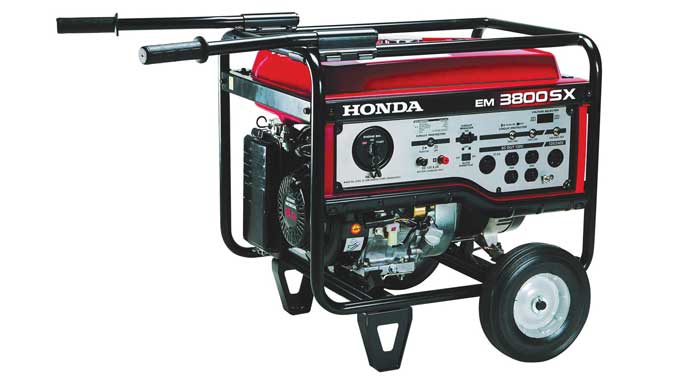After the ice storm Kirsten Brunner’s Beaverwood Farm in Hillsburgh, ON, was without electricity for seven days, leaving her struggling to feed, water, and safely manage 58 horses on the property as the temperatures plunged.
Her number-one ally, without question, was her 15-year-old Honda generator. “The generator is hooked up to the well, and that supplies water to the entire property,” said Brunner. “That is part of our emergency preparedness. I’ve run this business here since 1986, and that was one of the first things that we invested in, knowing perfectly well that without hydro we can’t get the water out of the well.” The generator – which was purchased second-hand and has since been rewired to the house by an electrician – has certainly paid for itself as it soldiered on through a number of lengthy blackouts over the years. “We just switch three panels down in the basement and we’re ready to go,” says Brunner, who adds that the 98-acre property has a river running through it as well, so as a backup they can always “do it like they did in the 1800s – chop a hole in the ice!”
Brunner tried to stick to a daily routine in spite of the weather. “Our horses are very comfortable with living outside, so even with the ice storm and the severe conditions of the footing, our animals still went out every day – from 7:00 in the morning until 3:00 in the afternoon. They are used to the routine; when you lock horses up in stalls for three or four days, they come out and explode, and that’s when accidents happen.”
She stressed how important it is to have plenty of feed supplies on hand. “We have 170 round bales on the property and 4,000 squares laid in by the end of September. I don’t believe in running around in January with a pickup truck trying to buy a load of hay at premium cost. It’s all about being prepared and not being left at the last minute in a panic.”
Brunner is also adamant about having feed available to the horses at all times – not just twice a day at mealtime. “Have enough round bales out in the paddock to munch on,” she advises, providing needed energy to the horses and saving you a lot of leg work slogging square bales out through deep snow.
No power also means no internet and often no cell phone service. “I have two rotary telephones in the barn [which will work during a blackout],” explains Brunner. “I get a chuckle when the little kids are in the barn and have to call home to get mom to pick them up after their riding lessons. They’ll come to the house and ask “how do I work that telephone?”
Preventing the water in the barn from freezing during the ice storm was a bit dicey once temperatures really began to plummet. “As the temperature started to go down, I was getting a little worried that the water coming into the tack room would freeze,” admitted Brunner. ‘I had insulated the doors properly years ago; I replaced the floors upstairs in the hayloft, and I cover the hayloft floor with hay so we had good insulation in the barn. The water buckets didn’t freeze, so I opened up the tack room doors so the warm air generated from the horses would go back into the tack room. “During night check at 10:30 or 11, she would run the water for a while and flush the toilet just to ‘keep things moving.” The humans remained comfortable as well; Brunner says the farmhouse is a bit “off the grid,” with two woodstoves supplying heat.
“The only thing you don’t have control over is that emergency veterinarian call, but I do have a certain amount of pharmaceuticals in my possession, such as Banamine and pain killers,’ said Brunner, adding that something no one wants to think about is a horse that is critically injured when the roads are impassable. “What if a horse goes down with a broken leg? Do you have a snowmobile to go and pick up the vet? Does one of the neighbours have a gun?”
Inconveniences aside, Brunner says her business did not come to a screeching halt during the severe ice storm. “My indoor arena has lots of natural light, so I ran my lessons during the day. My horses kept on with their work and the boarders came up and rode.”

